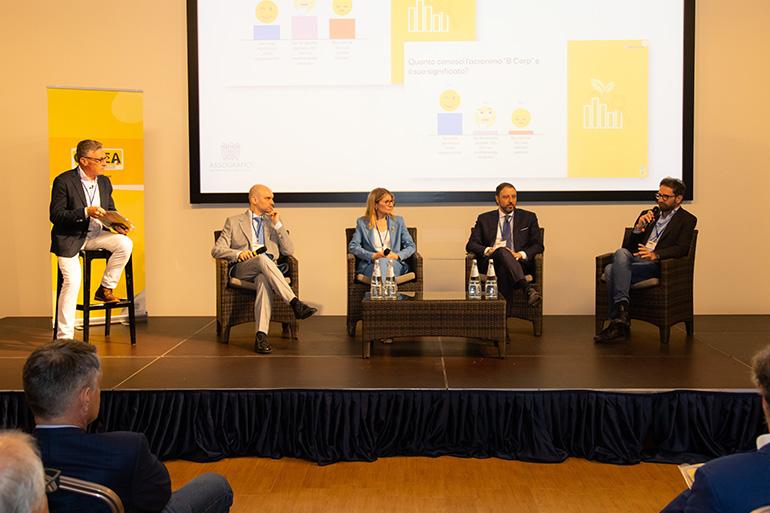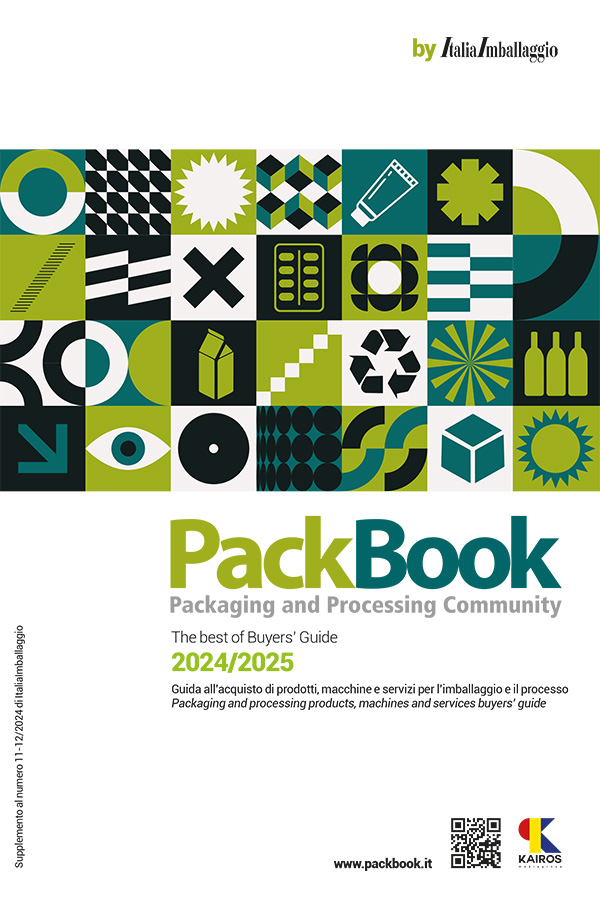Innovating with sustainability (and not only)
The Gipea Spring Conference took place in Lazise on 15 and 16 June 2023, offering interesting perspectives on the market, the international situation and on new opportunities for governing complexity in an ethical way.
C.C.
Analysing the prospects of the sector and taking stock of market trends were the main goals of the Conference, preceded by the annual general meeting of Gipea (Gruppo Italiano Produttori Etichette Autoadesive - Italian Group of Adhesive Labels Producers which belongs to Assografici)
«In the period 2022-2023, the sector was particularly affected by increases in the prices of paper and plastic raw materials, which then stabilised only in the first half of 2023»
Gipea president Elisabetta Brambilla commented on this in his opening remarks, underlining how in the graphics and paper industry sectors, 2022 was an anomalous year in which turnover and production did not grow together, probably due to the influence of the increase in energy and raw material costs.
«An internal survey in the sector carried out at the beginning of the year - she added - reveals that, for the labels sector, a growth of 2% is expected in the first quarter and 4% for the first half-year, both in terms of turnover and production».

Make way for measurable sustainability: the “B Corp” case
An interesting part of the 2023 conference were the broad reflections made on the B Corp model, which pushes the sustainability concept beyond environmental aspects and introduces analyses of the organization, essential for the acquisition of the certification.
B Corp aims, in fact, at organically integrating environmental and social sustainability principles in production, also in the case of small enterprises. This is the case of the Sales company; a B Corp since 2018 and today a benefit company, it represents an emblematic experience for the world of labels. Domenico Tessera Chiesa, member of the Gipea directive and Managing Director of the company, talked about this in some depth, contextualizing the path to sustainability in the reality of a label factory.
«With B Corp Assessment, we discovered a system that allowed us to objectively measure the aspects linked to the company’s environmental impact» Tessera Chiesa began. «Sales doesn’t need to directly communicate to its consumers the sustainability of the product and, as a small enterprise has obvious difficulties in focusing on what is not its core business. What matters most in order to embark on a path that includes B Corp and other sustainable initiatives is the commitment of the owners and a strong inclination towards innovation. Our journey started putting processes under control with certifications such as ISO 14001 acquired in 2002, FSC in 2009 and the Driving Green project in 2016, which helped us to develop a greener range of labels. We were perceived for a long time as aliens, given that the sustainability of a label factory was a theme that no one considered in 2002».

And yet, following a widespread trend that sees the big brands leading the sustainability challenge, small and medium enterprises can also play a significant role, embracing new challenges, as Sales in fact did in 2016, when the customer Olio Carli requested us to fill a B Corp assessment.
«The involvement of an important customer allowed us to embark on a process which, in 2018, probably made us become the first B Corp-certified label factory in the world. At the time, it was a “standard” still largely unknown but already significant, not only for enterprises but also for the social and economic contexts in which they operate. Today, in 2023, the business watchwords are innovation, lateral thinking, environmental protection, bio-based and care of people: these cross-cutting themes impose a search for points of reference external to the organisation. This is one of the great advantages of the B Corp method, which impels exchange with auditors and the use of benchmarks that make it possible to move towards ever-increasing sustainability with an ecological, social and economic impact which is rigorously measurable and certified. The interdependency aspect should be noted: it’s not enough to make product of quality, but sensibility is needed regarding its impact, which thanks to B Corp can be constantly monitored with a benchmark which is constantly changing, becoming ever more demanding. There are as many as 200,000 companies that take part in the assessment, of which only 4% become B Corps: a method that offers an effective framework of a business’s capacity to produce value for itself and for the environmental and social context in which it operates».
"Future horizons: innovation, sustainability and resilience": the two days of GIPEA, dedicated to challenges and opportunities in the sector, covering complex scenarios and sustainable development. This is a review of the proceedings.
First day. After the opening speech made by the President of Gipea, Elisabetta Brambilla (text set out in the facing page), Francesca Ricupero, Sales Manager ltaly of BOBST took the floor, with a focus on technological innovations aimed at achieving particularly important objectives today: the sustainability and recyclability of materials, and the standardization of processes, for an increase in competitiveness. Valentina Zanini, Evolution Guide at NATIVA Srl SB and Domenico Tessera Chiesa, member of the Gipea Directive and Managing Director of SALES Srl, then took the floor to put the spotlight on a practical approach to the ecological transition, that is, the B Corp certification (of which we also provide a broad summary on the facing page). They were followed by Alessandro Garofalo, founder of Garofalo & Idee Associate, with an examination of the characteristics that made Leonardo da Vinci creative and brilliant
«because - he claims - in a complex rapidly changing scenario, what made the difference was his ability to think outside of established boxes».
Second day. Erik Ciravegna (PhD in Design, Osservatorio Innovazione Packaging, Advanced Design Unit, University of Bologna) opened talking about the challenges and opportunities inherent to packaging sustainability:
«Packaging is a complex phenomenon, with numerous and complex functionalities. To win the sustainability challenge, it’s essential to consider not it not only as an envelope, but also as a bridge that puts different contexts into contact». Ciravegna then affirmed that «It is necessary to adopt a systematic and ethical approach to packaging design, in order to have a deeper and more balanced understanding of the impacts, both negative and positive, not only on the product, but also on the market, on society and on the planet».
Marco Costanzo (Head of Sales) and Anna Magon (Sustainability Manager, of Ayming Italia Srl SB, part of Ayming Group), then underlined the importance of the Sustainability Report and presented a further concrete example, illustrating the journey and commitment of Eurolabel srl in drawing up their sustainability report. The company made an initial assessment with the FpS tool (the reporting tool of Federazione Carta e Grafica (Paper and Graphic Federation) available for member companies) to understand at what point they were at in their reporting programme. The company later completed the report with Ayming’s support: an important step for the adoption of an increasingly responsible business model. The two days closed with an interactive session, which involved the participation of all those present at the Conference, invited to express their opinions and points of view during the course of a concluding round table moderated by Stefano Salvemini, Vice President of Gipea.


















